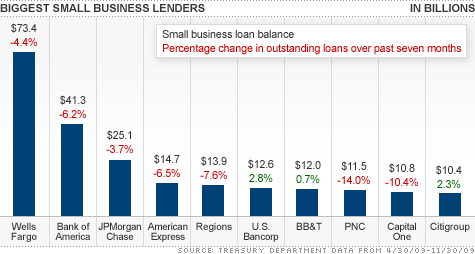Banks Pull Another $1 billion from Small Business Lending
Banks Pull Another $1 billion from Small Business Lending
Source for Article: CNNMoney.com, by Catherine Clifford

NEW YORK (CNNMoney.com) — The nation’s biggest banks cut their collective small business lending balance by another $1 billion in November, according to a Treasury report released late Friday. The drop marked the seventh straight month of declines.
The 22 banks that got the most help from the Treasury’s bailout programs have cut their small business loan balances $12.5 billion since April, when the Treasury began requiring them to file monthly reports on the tally. The banks’ total lending has fallen 4.6% in that seven-month period, to $256.8 billion.
In December, the President met with a dozen CEOs of the nation’s biggest banks to pressure them to reverse their small business lending declines.
Hitting bottom: There are some signs the credit drop may be at or near its nadir.
Five of the 22 banks reported higher small business loan balances in November than they did in April. At others — such as Wells Fargo (WFC, Fortune 500), by far the biggest small business lender — the totals have fluctuated month to month.
But 10 of the 22 banks have cut their small business balances every single month since April. That list includes firms such as JPMorgan (JPM, Fortune 500) that are now posting monster profits. In the past seven months, JPMorgan’s small business loan balance has dropped by almost $962 million, or 3.7%.
On Friday, JPMorgan Chase reported earnings of $3.3 billion in the last three months of 2009. JP Morgan said its compensation expenses rose 18% during the year to $26.9 billion, much of which will be distributed as bonuses.
JPMorgan was the first major bank up to bat to report financial results. Later this week, Citigroup (C, Fortune 500), Bank of America (BAC, Fortune 500), Wells Fargo, Goldman Sachs (GS, Fortune 500) and Morgan Stanley (MS, Fortune 500) are all slated to release their fourth-quarter and full-year numbers.
Bonus backlash: American taxpayers are sour on the idea that the bankers they bailed out are pocketing super-sized end-of-year bonus checks.
The day before JPMorgan reported its earnings, President Obama called on Congress to tax the largest banks in a so-called “financial crisis responsibility fee.”
As the backlash gained steam, one representative in Congress proposed a bill that would siphon money from Wall Street bonuses directly to into small business coffers.
Rep. Peter Welch, D-Vt., introduced a bill on Thursday calling for a 50% tax on bonus compensation in excess of $50,000 at banks that received government assistance. All revenue raised from the tax would go directly to the Small Business Administration to fund a new direct lending program. Twenty-three members of the House of Representatives co-signed the bill.
“With double-digit unemployment in a recession they helped cause, there’s no justification for seven- or eight-digit banker bonuses,” said Rep. Lloyd Doggett, D-Texas, one of the bill’s co-sponsors.
SBA-backed lending has begun to rebound from last year’s wipeout. The agency’s flagship program funded 37% more loans last quarter than it did a year earlier, totaling $3.8 billion.
Chicken or egg? Banks say they are lending less for two key reasons: Small businesses are risky borrowers, and fewer entrepreneurs are looking to borrow and take on more debt in the face of slower sales.
But small business owners tell a different story. They say that tighter lending standards leave too many viable businesses unable to access the credit they need to grow or finance routine operations like buying materials to fulfill customer orders. Lending standards have been growing steadily more restrictive for nearly three years, according to the Federal Reserve’s most recent Senior Loan Officer Study, released in October.
Edward Yingling, CEO of the American Bankers Association, says that finding the right balance between caution and investment is critical to spurring economic recovery.
“Bank regulators need to be prudent without being so punitive that they choke off lending in communities across the country,” Yingling said last month. “Just as too much risk is undesirable, over-correction will impede economic recovery if banks are prevented from making good loans to creditworthy borrowers.” ![]()

